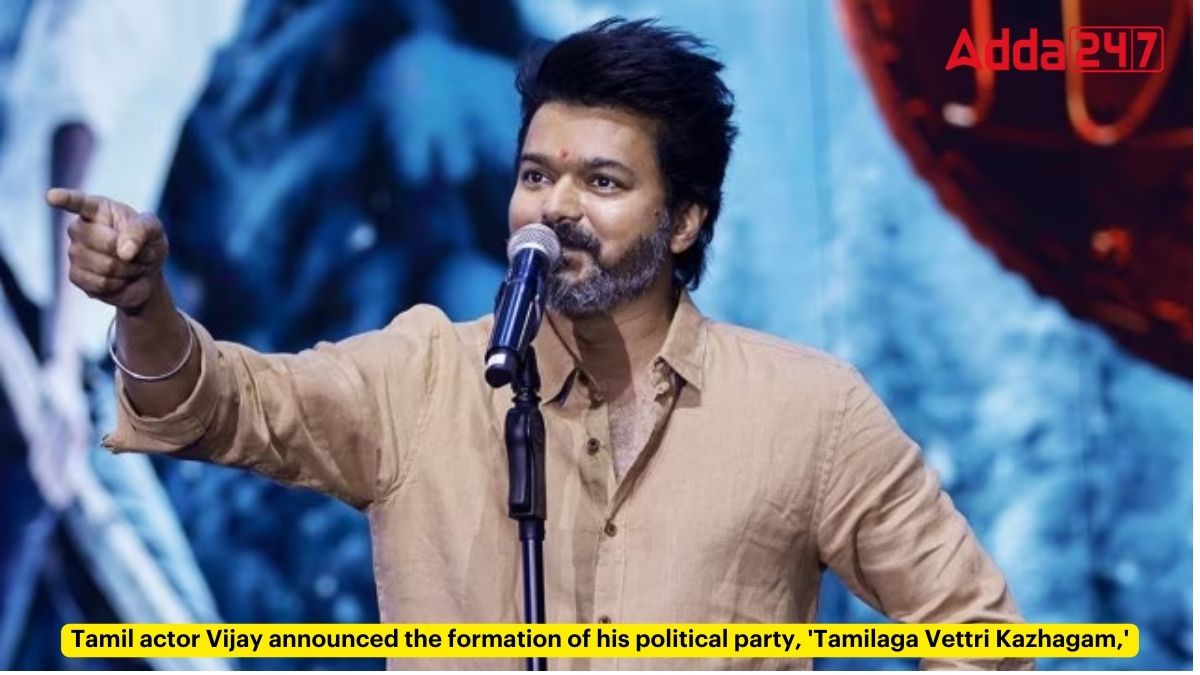


Actor Vijay has called for a mega-conference in Villupuram district today, where he will address his supporters and reveal the ideology of his new party, Tamilaga Vettri Kazhagam (TVK). The event is expected to draw over two lakh people, causing traffic congestion in the surrounding areas. However, reports of lack of amenities and participants struggling with heat have also emerged.
Vijay's Political Journey: Unveiling the Vision of Tamilaga Vettri Kazhagam (TVK)
South Indian superstar Vijay, known for his electrifying performances on screen, has embarked on a new chapter in his career—politics. After years of speculation, the actor has finally launched his own political party, Tamilaga Vettri Kazhagam (TVK). The party's inaugural conference, held in Villupuram district on June 22, 2023, marked a significant milestone in Vijay's political aspirations.
Background:
Vijay's political inclinations have been evident over the years through his outspoken views on social and political issues. In the past, he has openly criticized the ruling Dravida Munnetra Kazhagam (DMK) government for its alleged corruption and inefficiency. His support for the Jallikattu tradition and his opposition to the hydrocarbon project in Neduvasal further solidified his image as a leader with strong principles.
TVK's Launch and Ideology:
The launch of TVK marks a new phase in Vijay's political involvement. The party aims to provide an alternative political platform for the people of Tamil Nadu, emphasizing the principles of transparency, accountability, and social justice. According to Vijay, TVK's primary focus will be on solving the fundamental problems facing the state, such as unemployment, poverty, and corruption. The party's manifesto is expected to outline specific policies and programs to address these issues.
Mega-Conference in Villupuram:
The inaugural conference of TVK was held in Villupuram district, drawing over two lakh supporters from across the state. Vijay delivered a rousing speech, outlining his vision for the party and the future of Tamil Nadu. He called for unity, hard work, and dedication from his followers, promising to usher in a new era of prosperity and development for the state.
Challenges and Concerns:
Despite the overwhelming support for Vijay and his party, there are also some challenges and concerns that need to be addressed. Reports have emerged of inadequate amenities and participants struggling with heat at the conference venue. Additionally, some political analysts believe that Vijay's lack of experience in government may pose a challenge in effectively leading the state.
Top 5 FAQs and Answers:
Q1: What is the ideology of Tamilaga Vettri Kazhagam (TVK)? A1: TVK emphasizes principles of transparency, accountability, and social justice, aiming to solve fundamental problems facing Tamil Nadu.
Q2: Who is the leader of TVK? A2: Actor Vijay is the founder and leader of TVK.
Q3: What is the main focus of TVK? A3: TVK's primary focus is on addressing issues such as unemployment, poverty, and corruption in Tamil Nadu.
Q4: What challenges does TVK face? A4: Challenges include inadequate amenities at events, concerns about Vijay's lack of experience in government, and skepticism from some political analysts.
Q5: What is the future of TVK? A5: The future of TVK depends on its ability to address challenges, attract strong candidates, and resonate with the aspirations of the people of Tamil Nadu.

In a step towards promoting ethical governance and preventing corruption, Chief Secretary Atal Dulloo administered the Integrity Pledge to officers and officials at the Civil Secretariat in Srinagar. This marked the beginning of the National Vigilance Awareness Week, a nationwide campaign held annually by the Central Vigilance Commission. The theme for this year is "Vigilance: Our Shared Responsibility", emphasizing the role of collective efforts in upholding integrity, transparency, and accountability in public administration. Throughout the week, various activities will be conducted to sensitize employees and citizens on the importance of honesty and integrity in governance.

In a bid to promote integrity and fight against corruption, the Central Vigilance Commission has declared the observation of 'Vigilance Awareness Week' with the theme 'Our Shared Responsibility'. Health Minister JP Nadda, during the launch, stressed the need for institutionalizing ethical practices and building a culture of vigilance in every level of governance. He also urged for creating a checklist of do's and don'ts in simple terms to prevent unintentional wrongdoings.

Delhi Environment Minister Manjinder Singh Sirsa chaired a meeting to discuss ways to control dust pollution from construction activities in the city. He revealed that an extensive campaign has been launched to monitor and penalize illegal and unregistered construction projects. The Minister also directed officials to expedite field actions and simplify the registration process to ensure timely intervention against polluters.

In a press conference held in New Delhi, the Election Commission has announced phase two of special intensive revision of electoral rolls in 12 states. This comes after political parties raised concerns about the quality of the rolls. While Tamil Nadu Chief Minister MK Stalin arrived at DMK headquarters to discuss the issue, Assam's electoral roll revision will be announced separately due to the ongoing process of the National Register of Citizens. The EC has assured that there will be no obstacles in implementing the roll clean-up exercise in West Bengal.

President Droupadi Murmu addressed probationers of the Indian Police Service 77 RR (2024 batch) and emphasized the significant role that effective policing and future-ready technology play in promoting growth and attracting investment in any state. She highlighted the transformational impact of technology in the realm of policing and urged young officers to remain ahead in adopting new technologies, including AI, to combat threats to citizens. The President also encouraged ethical decision-making and accountability among young officers occupying positions of power and authority.

CEC Gyanesh Kumar has announced the second phase of the Special Intensive Revision (SIR) of electoral rolls in 12 states and Union Territories, covering 51 crore voters. He also addressed concerns over the state of West Bengal, clarifying that there is no confrontation between the Election Commission and the state government. Additionally, he reminded that Aadhaar card is not proof of citizenship, but can be used as identity proof in the SIR process.

After Chief Justice Gavai's formal recommendation, Union Government is set to appoint Justice Surya Kant as the next Chief Justice of India. With a distinguished legal career and key institutional roles, Justice Kant is highly regarded for his commitment to electoral transparency and landmark verdicts on various issues including abrogation of Article 370 and free speech. His term is expected to begin on November 24, 2025, and last for approximately 15 months.

On Monday, Union Home Minister Amit Shah inaugurated the fourth edition of the India Maritime Week 2025, where renowned leaders, policymakers, and maritime experts from India and abroad are expected to participate over the next 5 days. In his keynote speech, Shah highlighted India's growing maritime strength and strategic location, citing the government's efforts to increase port handling capacity and develop new mega and deep-draft ports. He also inaugurated state-of-the-art Deep-Sea Fishing Vessels under the Pradhan Mantri Matsya Sampada Yojna at Mumbai's Mazagaon Dock. The event, organised by the Ministry of Ports, Shipping and Waterways, is being held in partnership with the Indian Ports Association and will conclude on October 31.

The annual Chhath Puja festival has once again become a battleground for Delhi's political parties, with the AAP accusing the BJP-led government of creating an "artificial Yamuna" to cater to PM Modi's ceremonial dip while ordinary devotees are forced to pray in the highly-polluted river. While AAP leaders criticize BJP for disregarding the sentiments of devotees, the latter defends their preparations, citing "unprecedented arrangements" for the festival. However, as the parties argue, environmental reports continue to warn about the dangerous levels of pollution in the Yamuna, posing a serious threat to the health of devotees.

Prime Minister Narendra Modi took to social media to share his Diwali celebration on board the INS Vikrant with the Indian Navy. He expressed his gratitude for the opportunity and highlighted the juxtaposition of the vast ocean and Mother India's brave soldiers. The Prime Minister also witnessed an impressive Air Power Demo and participated in the Bara Khana with naval personnel.